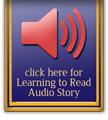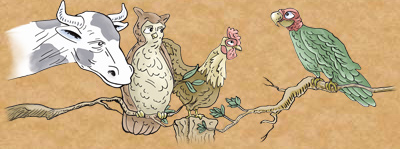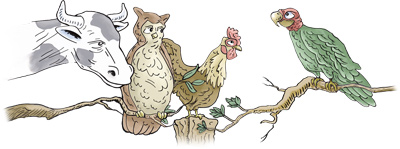Several animals were arguing among themselves over which of them was the most important of all creatures on earth.
“I am the most important creature on earth,” said a proud rooster. “We roosters wake up all the farmers around the world so they can go to work and grow food.”
“I beg your pardon,” replied one of the cows. “We cows are the most important. We give milk, and from milk comes butter and cheese and candies and cake and ice cream and a lot of other stuff.”
Just then, a large bumblebee landed on one of the cows’ horns. “I heard what you were arguing about,” said the bee. “Both of you are wrong. Bees are the most important of all creatures on earth. Bees fertilize flowers and fruit trees and vegetable plants. If it weren’t for bees, there wouldn’t be very much food to eat on earth.”
“All right!” shouted the rooster. “Let’s settle this argument right now. We’ll go over to the barn owl; she’s wise and knows everything.”
They all agreed and followed each other into the barn and awakened the owl. After hearing their argument, the owl replied, “All of you are very important. And the world would be in very bad trouble without you. But I must tell you this: The most important creatures on earth are people. You see, people are the only creatures who can take care of the earth.”
“Oh, no,” exclaimed the rooster, “that is hard to believe. I don’t think many people know that.”
“That’s right,” said the bumblebee. “Some people are destroying the land, the air, and the water.”
“That’s true,” responded the cow. “We had better talk to them.”
“How can we do that?” questioned the rooster. “Animals can’t talk to people.”
“Oh yes, we can,” said the owl. “The parrot can speak their language.”
“Yes,” said the rooster, “but parrots can only repeat things like, ‘Polly want a cracker.’”
“Well,” replied the owl, “that may be, but they can repeat other things like, ‘Have a nice day.’ Did you know that someone once taught a parrot how to say that, and when people heard her, they began saying that to each other all over the world?”
“Gee,” exclaimed the rooster, “we can do the same thing.”
“Yes,” said the owl, “and I have just the right words: ‘For all it is worth, take care of the earth—the land, the air, and the water.’ ”
“Hey, that’s beautiful,” said the bee. “Let’s go teach it to the farmer’s parrot.”
“Let’s,” said the others, as they all headed to the farmhouse, where Polly the parrot was perched on a branch.
“Hello, Polly,” said the owl. “We’ve come to teach you something important to say.”
The parrot looked around at all the animals, then replied, “Polly want a cracker.”
“No,” laughed the owl, “that is not what we want you to say. From now on, when anyone says ‘Hello, Polly,’ you keep repeating these words: ‘For all it is worth, take care of the earth—the land, the air, and the water.’ ”
There was a quiet pause, and the animals waited. The parrot then replied, “For all it is worth, Polly want a cracker. Polly want a cracker.”
“Oh, no,” said the owl, “I don’t think it is going to work. She can only repeat a few words at a time.”
“You mean we can’t get our message to the people?” asked the cow.
“No, we can’t,” replied the owl.
“What’s going to happen if we don’t?” questioned the rooster.
“I really don’t know,” replied the owl, “but I know there are still a lot of good people in the world who are trying to help us.”
This has turned out to be a sad story. But it doesn’t have to be if people like you and me remember: For all it is worth, take care of the earth—the land, the air, and the water.




